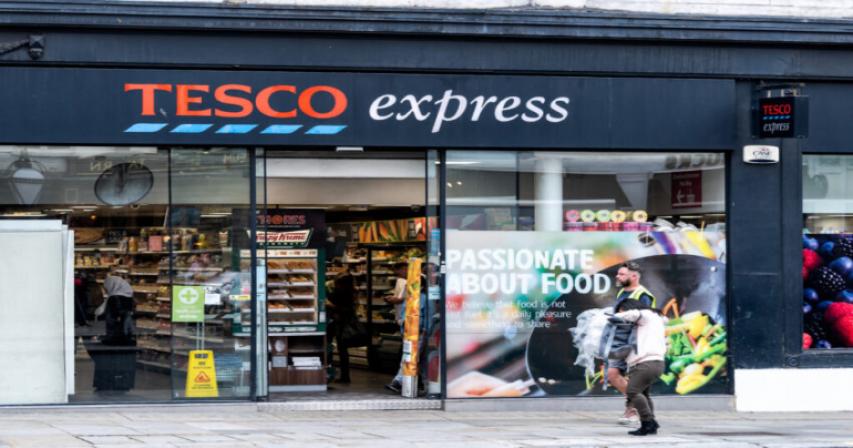Tesco tells chancellor to hit online rivals with sales tax
- 3 years ago

Tesco has called for a 1% sales tax to be levied on online competitors, including Amazon.
Boss Ken Murphy has also joined with Morrisons, Asda and Waterstones to ask Chancellor Rishi Sunak for a "level playing field" on tax.
They say the current system puts retailers with large estates at a disadvantage to online firms.
Retailers have not had to pay property-based business rates since the start of the pandemic.
However, the tax is due to restart in April.
Supermarkets including Tesco and Morrisons have handed back business rates relief worth £1.8bn to the government.
They had been criticised for taking government support during the pandemic while announcing dividend payments to shareholders.
Tax call
The chief executives of 18 companies and groups have written to the chancellor warning that a return to the old system "will hamper the recovery of the retail sector post-pandemic, potentially putting thousands of jobs at risk".
Business rates are calculated by looking at a property's rateable value and multiplying it by a tax rate set by the government. A new tax rate comes into effect at the start of each financial year on 1 April.
According to figures from the Office for National Statistics (ONS), full-year retail sales at physical shops for the 12 months ending 31 December 2020 fell 10.3% from £318.5bn in 2019 to £285.8bn.
The group of 18 bosses stops short of asking for an online sales tax, but Tesco has called for a 1% levy.
Last week, Amazon was criticised for paying less in business rates than British bricks-and-mortar retailers.
The online retail giant's financial results revealed that UK sales for 2020 totalled $26.5bn (£19.3bn) - a 51% jump from $17.5bn in 2019.
Amazon's overall business rates bill for 2020-21 is estimated by researchers to be £71.5m - just 0.37% of its retail sales.
Amazon insists that it pays its tax and has created thousands of jobs in the UK.
Retail adviser Altus Group says that bricks-and-mortar retailers would have paid £8.25bn in business rates in 2020, had they not been given a tax holiday due to the pandemic.
It says the figure was calculated using rateable values, multiplied by the 2020 tax rate. The £8.25bn figure amounts to 2.9% of total retail sales, which is much higher than what Amazon pays.
For instance, Arcadia - which owned Topshop, Burton and Dorothy Perkins at the time - would have had to pay £91m in business rates on its 444 stores in 2020, had there not been a tax holiday, Altus Group says.
Robert Hayton, UK president of property tax at Altus Group, told the BBC that changing the business rate system would be "a good place to start" in trying to correct the imbalance between online and bricks-and-mortar retailers.
However, he added that business rates had often been reviewed in the past 20 years and nothing had changed, because the need to keep the changes fiscally neutral meant that one sector could benefit only at the expense of another.
"If some additional money can be created through something like an online sales tax, and then crucially, if that can be ring-fenced and made available to make some improvements to business rates, then I think that's a really positive outlook," he said.
Supporting shops
Amazon would not comment on the calculations made by Altus Group and the Centre for Retail Research (CRR)
A spokesman for Amazon said: "We've invested more than £23bn in jobs and infrastructure in the UK since 2010.
"Last year, we created 10,000 new jobs and last week we announced 1,000 new apprenticeships. This continued investment helped contribute to a total tax contribution of £1.1bn during 2019 - £293m in direct taxes and £854m in indirect taxes."
A Treasury spokesperson said: "We want to see thriving High Streets, which is why we've spent tens of billions of pounds supporting shops throughout the pandemic and are supporting town centres through the changes online shopping brings.
"Our business rates review call for evidence included questions on whether we should shift the balance between online and physical shops by introducing an online sales tax. We're considering responses now and will update in due course.
"The 2020 Spending Review also confirmed that the business rates multiplier would be frozen in 2021-22, saving businesses in England £575m over the next five years."
Rates reform
James Daunt, managing director of bookselling chain Waterstones, told the BBC that shops had "clearly suffered hugely" during the pandemic.
"A tax on online sales would at least allow us to keep our shops open," he said.
He also called for business rates to be reformed or even scrapped in the interest of preserving jobs in local shops.
However, Sir Edward Troup, a former senior civil servant at the Treasury, said there were "30 billion reasons" why the Treasury would not want to abolish business rates.
"That's the amount of money roughly that business rates raise," he said.
Sir Edward said Treasury economists recognised that business rates were "inefficient", but added: "It's an old adage that you tax property because it doesn't move."
He said sales taxes were also inefficient because they pushed prices up for customers while being unrelated to the level of profit made by firms.
Source: BBC
Comments